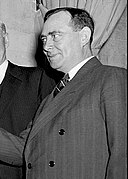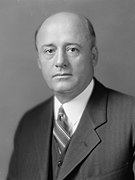Our website is made possible by displaying online advertisements to our visitors.
Please consider supporting us by disabling your ad blocker.
1952 United States House of Representatives elections
| ||||||||||||||||||||||||||||||||||||||||||||||||||||||||||||||||||||
All 435 seats in the United States House of Representatives 218 seats needed for a majority | ||||||||||||||||||||||||||||||||||||||||||||||||||||||||||||||||||||
|---|---|---|---|---|---|---|---|---|---|---|---|---|---|---|---|---|---|---|---|---|---|---|---|---|---|---|---|---|---|---|---|---|---|---|---|---|---|---|---|---|---|---|---|---|---|---|---|---|---|---|---|---|---|---|---|---|---|---|---|---|---|---|---|---|---|---|---|---|
| ||||||||||||||||||||||||||||||||||||||||||||||||||||||||||||||||||||
 Results: Democratic hold Democratic gain Republican hold Republican gain Independent hold | ||||||||||||||||||||||||||||||||||||||||||||||||||||||||||||||||||||
| ||||||||||||||||||||||||||||||||||||||||||||||||||||||||||||||||||||
The 1952 United States House of Representatives elections was an election for the United States House of Representatives to elect members to serve in the 83rd United States Congress. They were held for the most part on November 4, 1952, while Maine held theirs on September 8. This was the first election after the congressional reapportionment based on the 1950 census. It also coincided with the election of President Dwight Eisenhower. Eisenhower's Republican Party gained 22 seats from the Democratic Party, gaining a majority of the House. However, the Democrats had almost 250,000 more votes (0.4%) thanks to overwhelming margins in the Solid South, although this election did see the first Republican elected to the House from North Carolina since 1928,[1] and the first Republicans elected from Virginia since 1930.[2] It was also the last election when both major parties increased their share of the popular vote simultaneously, largely due to the disintegration of the American Labor Party and other third parties.
Outgoing President Harry Truman's dismal approval rating was one reason why his party lost its House majority. Also, continued uneasiness about the Korean War was an important factor. Joseph Martin (R-Massachusetts) became Speaker of the House, exchanging places with Sam Rayburn (D-Texas), who became the new Minority Leader.
This was the last time Republicans won control of the House of Representatives until 1994, despite the GOP controlling the presidency for the majority of the next four decades, Democrats outperformed in down-ballot elections, especially in the South, which had started to drift towards Republican presidential candidates. As of 2025, this is the last time the House changed partisan control during a presidential election, and the last time both houses did so simultaneously. This marked one of only two times in the 20th century in which the Republicans won a House majority without winning the popular vote, with the other time being in 1996;[3] it was also one of four times where either party did so in the 20th century, with the other three instances occurring in 1914, 1942, and 1996.[4][5]
Cite error: There are <ref group=lower-alpha> tags or {{efn}} templates on this page, but the references will not show without a {{reflist|group=lower-alpha}} template or {{notelist}} template (see the help page).
- ^ Fleer, Jack D. (1968). North Carolina Politics: An Introduction. University of North Carolina Press. p. 142. ISBN 0807810673.
- ^ Atkinson, Frank B. (September 1993). The Dynamic Dominion: Realignment and the Rise of Two-Party Competition in Virginia, 1945-1980. George Mason University Press. pp. 60–61. ISBN 0913696390.
- ^ Wasserman, David (March 1, 2019). "2020 House Overview: Can Democrats Keep Their Majority?". The Cook Political Report. Retrieved September 18, 2021.
- ^ Wang, Sam (February 2, 2013). "The Great Gerrymander of 2012". The New York Times. Retrieved May 29, 2013.
- ^ "In 1996, House Democrats also won the popular vote but remained in the minority (kind of)". Washingtonpost.com. November 12, 2012. Retrieved December 3, 2012.
Previous Page Next Page




